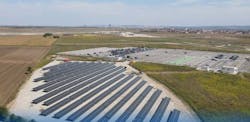Serbian airport installs 3K Solar Panels to generate 1.13M kWh of Zero-Carbon Energy
It’s fitting that an airport named for one of the giants of electricity innovation is embracing the new generation of energy resources.
The operator of the Nikola Tesla airport serving Belgrade, Serbia, has installed a solar energy now in operation. The solar panels, located near the airport complex, can generate approximately 1.13 million kWh of zero-carbon electricity annually, equivalent to the consumption of about 430 households.
The Belgrade Airport group says it can decrease the airport’s Scope 1 and 2 (direct and indirect) carbon dioxide emissions by 900 metric tons per year.
Belgrade Airport is a member of VINCI Airports and operates the Tesla site.
"Through sustainable operations, Belgrade airport aim to reach VINCI Airports’ goal of zero net greenhouse gas emissions by 2050,” Francois Berisot, CEO of Belgrade Airport, said in a statement. “ Since 2018, we have been implementing a number of environmental projects such as a natural gas heating plant, solid waste processing plant and wastewater treatment plant. We will continue to operate in a sustainable manner and contribute to a healthier environment.”
Read our Mission Critical Microgrids series focused on Airports
Part 1: The Redwood Coast Airport Microgrid
Part 2: The Pittsburgh International Airport Microgrid
Part 3: From War Zones to Emergency Rooms
The Serbian electricity sector, which up through the early 2020s generated about 70 percent of its power from coal, is moving toward cleaner emitting resources such as renewables. Hydropower accounts for close to 20 percent of the Serbian power generation mix.
The solar plant is located near the airport complex, on the road to Surčin, next to the new Tesla car park. The array consists of nearly 3,000 photovoltaic panels spread over a plateau of 15,900 square meters that convert sunlight into electric energy.
This initiative is part of VINCI Airports’ global efforts towards bringing about the environmental and energy transition. VINCI Airports reduced its carbon footprint by 28 % since 2018, notably by installing solar farms on its network of airports, already reaching 30 MW of solar PV power in operation.
Earlier this month, the government of Serbia announced it would seek to have 40 percent of its electricity generated from renewables by 2040. The state-owned power utility Elektroprivreda Srbije was ordered by the nation's energy ministry to suspend construction on the 350-MW Kolubara B lignite-fired power plant which was planned for operation by 2024.
The airport operators also are launching advanced energy efficiency initiatives.
The airport's namesake, Nikola Tesla, was born in Belgrade and eventually moved to the United States, which he helped develop the technology for alternating current electric transmission.
-- -- --
(Rod Walton, senior editor for EnergyTech, is a 14-year veteran of covering the energy industry both as a newspaper and trade journalist. He can be reached at [email protected]).






